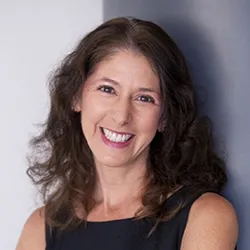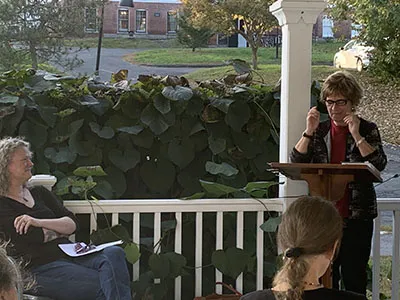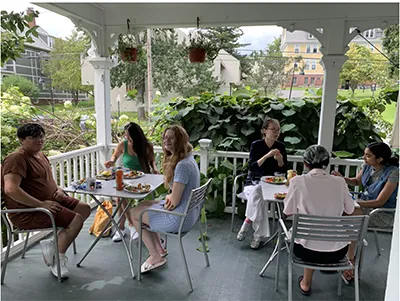Director’s Note: Democracy as Making Hope
Published February 17, 2022

We were all sure (or, at least, strongly hoping) that our college lives would return to in-person and on-campus rhythms in some way that looked “normal.” This we did not get. We traded the compromised ability to read people on Zoom (where we mostly appeared to each other as medium closeups searching for any other chain of shots to make sense of us) for the compromised ability to read people who were in masks during most of our interactions. (When I made that joke in class, was everyone grinning or groaning?) I spent some exciting time this past summer with the student fellows in the two year-long projects, Coping with Democratic Precarity and Democracies Redux, and, of course, it was all on Zoom. So, when I walked into our three-day intensive research workshop right before the fall semester started, I found myself in a now very familiar, and pandemic-specific, situation: a student whom I had only ever seen sitting at her post at the United Nations, always in a blazer, and usually with a mouth fixed in concentration, putting out about seven different fires at once, was now towering over me in jeans and a t-shirt. And a mask. But we were all together, and when we sat on the Kahn porch for lunch breaks, things seemed, if not normal, then at a place of contentment, for a moment. Having spent the previous year of projects entirely in remote space (and its concomitant remote time, which is a thing), masking up to be together, passing the salt and passing the ideas around, seemed far preferable. Did it feel normal? No. But we may have stopped searching even for a new normal, knowing how much inequity and erasure is attached even to so many “new normals.” What I did feel was that I was in the company of a remarkable group of students whose sense of purpose and sense that they were invested in caring for themselves, each other, and our world was deep. Their scholarship at the Kahn was inextricable from their desire to make the world better. And that, at Smith or at the Kahn, is not a first. This may be the only way in which we would want to deploy the word “normal” in our times.

On one of the most beautiful days in October, we had our first public event at the Kahn since the college’s full return to campus, a joint reading by Pam Petro (English) and Sara Eddy (Jacobson Center). It was a fitting one, since both Petro and Eddy incubated the books from which they read in Kahn projects. Petro’s memoir, The Long Field, emerged from the short-term project she and Marguerite Harrison (Spanish and Portuguese) organized, "Hiraeth, Saudade, and the Concept of Longing," in 2013. Eddy’s volume of poems, Full Mouth, was nourished in the year-long Food project (2018-2019, also known as the last normal year, though the project was anything but, in the best way). The porch was full of people who had not been able to be together like this in a very long time, and as the sun streamed onto the porch – sometimes squintingly so – we felt a kind of quiet collective euphoria that we could take in the fine work of our colleagues and do so right next to each other – with cider and donuts in hand. It was all of the senses, with none of the sensory abstinence of either Zoom or of the current Omicron-induced masking. Petro and Eddy introduced each other, and, as an encore, read each other’s work. It takes a certain kind of vulnerability and intimacy to let someone read your poetry cold, and in exchange, to attempt to get your mouth around a language (Welsh, in this case) that isn’t entirely familiar. Reading the work of a long dead, or simply not present, author is one thing, but there is a profound collegiality in reading the work of an author who is present in a kind of call and response, and a kind of gentle defamiliarization that seemed entirely fitting for a Kahn event.

Our year of return to campus has also been the Year on Democracies, for which the Kahn is a vital hub. And that has reminded me of the extent to which democratic practices are vital even where democracy isn’t the structure under which we carry out our work and lives. We have a president, and we have a cabinet, but Smith College is not a democracy. Pockets of the campus vote on things: the faculty recently voted to adopt a Journalism Concentration, which seems about as fitting a way to celebrate democratic practice as any. The Student Government Association votes on policy that touches students. I have come to learn from its president, Emily Paule, who is also a lab fellow in my YOD Humanities and Social Sciences Lab, that these votes run less programmatically up against faculty policy than we think, which is also to say that democratic processes can be messy. There are carefully constructed processes for representation that are designed to make sure that there is freedom of expression and discourse, we have codes and policies, but we shouldn’t mistake these conditions for democracy itself, nor would that necessarily be our aim. These are among the kinds of conversations happening in the two yearlong projects in 2021-22. Every project sets its own rules and develops its own culture. Precarity spent the fall largely inviting speakers to come to their seminar group, and one of the highlights was the discussion they had with Yaku Perez, second place finisher in Presidential elections in Ecuador and leader of that country's ecofeminist party. Artist Yu-Wen Wu’s engagement with Redux started in the fall, but will be going on for the rest of the year through a Presidential Innovation grant-funded “Bundles” project, Voices, Visibility and Versatile Artistic Praxis: Asians/Asian Americans at Smith College, a narrative- and Special Collections-based collaboration that includes the Kahn, SCMA curator Yao Wu, and Jess Bacall at the Wurtele Center for Leadership.
As with the campus-wide yearlong attention to climate change in 2019-20, the Year on Democracies knows it’s not going to solve anything on its own. It knows that the inspiration of a steady stream of speakers who are dug in deep on issues of democracy – from Presidential Colloquium kickoff House Speaker Nancy Pelosi to Cromwell keynote speaker Black Voters Matter founder LaTosha Brown, from Precarity hosted Jamila Michener, a scholar of systemic racism in health care policy, to Redux hosted Yu-Wen Wu, an artist who animates marginalized narratives, and many, many more – is a map of stars by which to navigate a course not to a destination, but to a process and a shift in ways of inhabiting conversations. That has never been more evident than in Masha Gessen’s presidential colloquium on February 15. In a conversation guided by the title, “Hope and Hopelessness,” Gessen posited that they saw the current generation (including our students) as manifesting a kind of hopelessness (not without cause) unlike like anything else in human history. The intersections of democratic fragility (including racism), the pandemic, and climate change make it easy to see why. Evoking the thinking of Czech dissident Václav Benda, Gessen then walked through a history of, and the potentials for, a “parallel polis,” a non-bureaucratic parallel sociopolitical structure to the dominant that would be ready, active, and functioning when, inevitably, the dominant falls. Imagining and constructing such a polis is a way of restoring hope. Not a false or performative hope, but one intentionally made out of the real and the possible. Presuming, as I think Gessen does, that the most viable alternative to authoritarian rule (always backward looking, and rarely in anything other than a falsely nostalgic regard) is some range of democratic practices, one of the most important steps to achieving it is recognizing that democracy isn’t a thing, or even a set of institutions. It’s a process. As Gessen suggested, “Democracy resides in the public conversation.”
This public conversation is central to the Year on Democracies. We may look back on this year and see that we have chosen to talk as much about how to talk as what to talk about. Though the yearlong projects are the through-line of the work we do at the Kahn, many of them would not exist without having been short-term projects first – the incubator that incubates the incubator. This second mode of Kahn practice is as vital to the work we do at and for the college, not least because it offers an experimental space to try different modes of discourse. It has been a particular pleasure to see the evolution of conversation in series of short-term projects starting with Racialized Medicine, Past and Present: Teaching and Research in the Spaces Between STEM and the Humanities in Spring 2021 and continuing this year with Democratizing Health I in fall 2021 and Democratizing Health II this spring, kicking off with a lecture (register to attend) by sociologist Tony Hatch, “The Data Will Not Save Us: Afropessimism and Racial Antimatter in the COVID-19 Pandemic.” The arc of these shorter projects will culminate in fall 2022 in the longer-term project, Health and Medicine, Culture and Society: Crossroads in a Liberal Arts Education. In addition to a spring semester symposium, it is likely that the culmination of Crossroads will be new initiatives at the college that bring students, faculty and curriculum from across the divisions into more intentional discourse about what’s on the left side of that colon, making the most of what’s on the right side of the colon – the liberal arts.
Our other long-term project for next year, Common Grounds: Toward (Re)Thinking Global Indigeneity (2022-23) is the product of a different kind of experimentation. For the first time, the Kahn Liberal Arts Institute will collaborate with Five Colleges, Inc. and their Mellon Grant in support of Native American and Indigenous Studies, at the Five Colleges. This project brings together faculty and students from all five colleges. The faculty have come together like this many times before, but including Five College students as fellows at the Kahn, not just Smith students, is a first. This project, too, will be planning a spring symposium, as well as doing strategic planning for a Five College NAIS research center. Common Grounds takes the unusual step, for the Kahn, of using one research institute to help imagine another.
All of the Kahn programming this year touches on democracies. Earlier this month, “Is There a Latinx Vote?” asked a question unlikely ever to have a stable answer. And in another redux move, “Excavating the Image,” an annual collaboration with the Smith College Museum of Art, will return, in April, to examining Isaac Julien’s moving image installation, Lessons of the Hour, a major new acquisition currently on view in the new media gallery. Julien will also deliver the annual Miller Lecture on April 5. Lessons of the Hour centers freedom fighter Frederick Douglass (and many of the women with whom he did such important work), an apt focus for the Year on Democracies. Douglass concluded the lecture that gives Julien’s work its name, thus: “Recognize the fact that the rights of the humblest citizen are as worthy of protection as are those of the highest, and your problem will be solved; and, whatever may be in store for it in the future, whether prosperity, or adversity; whether it shall have foes without, or foes within, whether there shall be peace, or war; based upon the eternal principles of truth, justice and humanity, and with no class having any cause of complaint or grievance, your Republic will stand and flourish forever.” The capacity to imagine beyond the “logics” of slavery or the brutalities of reconstruction, and to imagine toward a better definition of the Republic is kin to the parallel polis Gessen described. In its modest way, the work of the Kahn, where we incubate eggs that hatch creatures we cannot predict and whose shape we will neither prescribe nor proscribe, where imagination is the foundational term, even before thinking, is designed to contribute to the idea of the parallel polis (even by other names) that is a precondition for liberation in a democracy not yet realized.